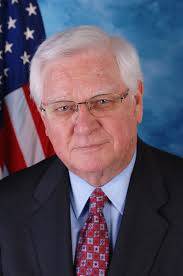FY20 funding bills promote national security
Published 10:00 am Friday, January 3, 2020

Rogers
WASHINGTON, DC — As a senior member of the U.S. House Appropriations Committee, Congressman Hal Rogers (KY-05) recently supported two funding packages that fund government operations for Fiscal Year (FY) 2020. The bills place a strong emphasis on national defense and military readiness, border security and the well-being of our nation’s veterans.
The FY20 Defense appropriations bill continues to rebuild our military and is fully consistent with President Trump’s National Defense Strategy and Nuclear Posture Review. It provides $693.3 billion for the Department of Defense (DOD), $19 billion more than FY19. This includes $70.7 billion for Overseas Contingency Operations, ensuring that the men and women in uniform overseas have the tools they need to be successful.
The bill also includes a 3.1 percent pay raise for our troops—the largest pay raise in a decade—and supports key readiness programs that will prepare our troops for combat and peacetime missions, including flight time and battle training, equipment and facility maintenance and base operations.
“The Department of Defense receives additional resources to support our war-fighters with the best available technology. We also provide these brave men and women with a hard-earned and well-deserved pay raise,” said Rogers, speaking in support of the legislation on the House floor. “Within the committee, I have been particularly focused on keeping the DOD’s electronic health record on track, and this bill takes bold steps in the right direction to ensure our service members continue to receive the best possible care when they transition out of active duty into the VA.”
The Defense bill funds the U.S. Space Force, a major priority for the Trump Administration, which is a sixth military branch established to ensure U.S. interests are protected around the world and in space. Additionally, $34 billion allocated for the Defense Health Program, which provides comprehensive care for our active duty troops, their families and retirees. It also funds critical research for many health issues which affect our service members, including several forms of cancer, traumatic brain injuries and psychological health.
In addition to its focus on our military, the bill also prioritizes domestic security through border security and immigration enforcement. The U.S. Customs and Border Protection is receiving $14.92 billion – which will allow the agency to hire an additional 300 Border Patrol processing staff, procure advanced border technology and stop the illegal flow of drugs and human trafficking across our borders. The bill provides $1.375 billion for construction of new border wall and contains no restrictions on the President’s authority to enforce our immigration laws.
“President Trump is rightly focused on addressing the crisis at our southern border, and this legislation will support his efforts to end the seemingly unending flow of drugs that find their way into nearly every American community, as well as the violence of the brutal cartels who profit from this trade. Nearly $1.4 billion is included for a border wall, along with additional resources for DHS to hire more personnel and deploy advanced technology in this region,” Rogers said in his floor statement. “We were also able to eliminate dangerous riders that would have limited the President’s ability to enforce our immigration laws while still ensuring a strong humanitarian response that reflects our values as Americans.”
Kentucky’s veterans will also receive additional resources as a result of this package.
The bill provides $91.9 billion for the Department of Veterans Affairs (VA), the largest dollar amount in its history. It funds VA medical care at $80 billion, providing care for more than 7 million veteran and dependent patients. $1.5 billion is included for the new VA electronic health record, ensuring our veterans receive proper care, with timely and accurate medical data secured in identical DOD and VA systems.
The bill seeks to further reduce the disability claims backlog to ensure adequate compensation and care for the almost 65,000 veterans still awaiting final decisions on their claims. It also provides $5 million for a new pilot grant program to help rural veterans get to their VA appointments.
“I advocated for a new pilot program to provide transportation assistance for our nation’s many rural veterans—like those in eastern Kentucky—and I am grateful for the seed funding to get that off the ground,” continued Congressman Rogers.
Click here to see a full list of appropriations highlights for southern and eastern Kentucky.






